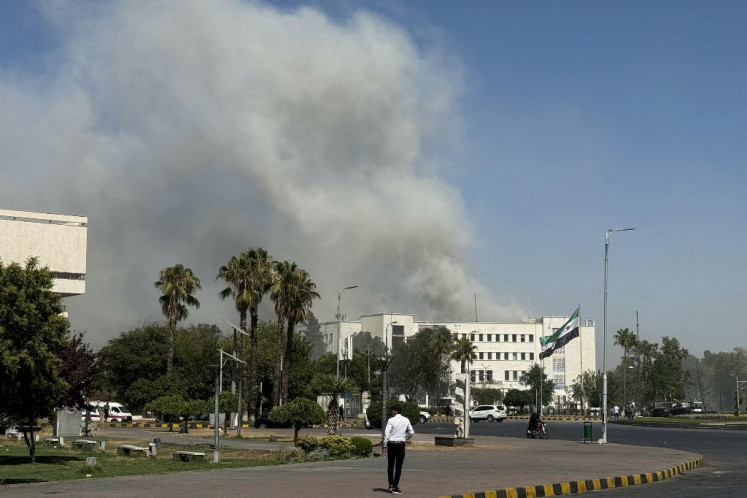Popular Reads
Top Results
Can't find what you're looking for?
View all search resultsPopular Reads
Top Results
Can't find what you're looking for?
View all search resultsDiscoursing the politics of media
The recent announcement of the entrance of media mogul Hary Tanoesoedibjo into the political landscape has sparked speculation among political analysts over the objectivity and impartiality of media reporting in the upcoming general elections
Change text size
Gift Premium Articles
to Anyone
T
he recent announcement of the entrance of media mogul Hary Tanoesoedibjo into the political landscape has sparked speculation among political analysts over the objectivity and impartiality of media reporting in the upcoming general elections.
Tanoesoedibjo’s decision to join the newly established Nasdem Party, co-founded by another media tycoon, Surya Paloh, is not without political calculation. As a media czar, Tanoesoedibjo is cognizant to the power of discourse manifested via the dissemination of news both in print and electronic media.
He must have also been aware that life is always surrounded by discourse, such as the newspapers to read, the talk show and news to watch from TV, the music and news to listen to from tapes and radios, all of which people inevitable encounter every day.
The political move many media businessmen took undoubtedly strengthens the widely-held assumption that despite potential biases and subjectivities, the content of media still exerts a powerful influence in shaping and cajoling people’s opinions. This move, as many observers envision, has the potential of tainting the image of media as a free, independent means of community-based education.
The fear is that the affiliation of media with political parties will be the erasure of neutrality and balanced reporting, eventually giving rise to biased and politically-loaded media coverage.
With many media now owned by key figures strongly affiliated to political parties, the media war will likely herald an era of ferocious semiotic political campaigns in the near future.
Even without physical presence of politicians who attempt to garner votes for their parties, the media they own can one-sidedly represent their ideologies, values, belief, and interests. Media then can become the subliminal mediator between politicians and the community they intend to reach and influence for the sake of the former’s benefits.
Probably, the most apparent consequence of the marriage between politics and media is that the discourse of persuasion and reporting typical especially in newspaper editorials and reportage will become distorted due to political motives and interests vested in the media by the media owners.
Thus, if the media is politicized for the sake of disseminating political messages of their owners it is plausible to surmise that the mode of persuasion and reporting will transform into political discourse — one that is replete with scheming argumentations.
It is nevertheless safe to lay a claim that no single media (print and electronic) is value-free in their contents, as they cannot free themselves from the ideology and “politics” of their owners. This is to say that all media have radically different sets of belief, assumptions, missions and visions regarding news dissemination, and that they are bound by these agreed conventions.
However, as people from the grassroots have now become critical to what they read and watch, it is not always difficult for them to feel and trace the differences between the modes of argumentation (both spoken and written) infiltrated by political motives from those which are relatively free from both individual’s and group’s political intents.
In addition, with the ubiquity of discourse in their life, people are sensitive enough to discern political discourse which has the tendency of being manipulated, controlled by unequal power relation, and suppressive from other types of discourse they are already acquainted to.
Research in the study of rhetoric (i.e. the pattern of thoughts) has enlightened us that political discourse is marked with political contents which are linked with the government’s activity and with the power relation between the authority (who holds the power) and the society (who has the less power).
If further scrutinized, such a discourse tends to suppress the mind, discourages one’s critical consciousness, obscures and belies the reality, and assumes those who hear and read it can be easily coaxed.
In many cases, however, precisely detecting reporting which is politically biased from those which are relatively neutral is often times difficult, partly because political messages are often deliberately infused into the modes of reporting and persuasion, blurring the boundary between neutral and biased reporting, and hence the discourse of reporting and political discourse.
Politicians, in establishing their personal ethos (speaker’s and writer’s credibility), often hide their political messages in the discourse of persuasion and reporting in order to gain sympathy and acceptance from the public. The realization of this ethos is clearly reflected in the semantic contents, patterns of speech/writing, and appeal to arguments of the reporting and talks.
It is only with critical mind and continuous interrogation can people either dismiss the ethos of political discourse as irrelevant with their interest and belief or respond and take it seriously.
The writer is an associate professor at Atma Jaya Catholic University. He is also chief editor of Indonesian Journal of English Language Teaching.










